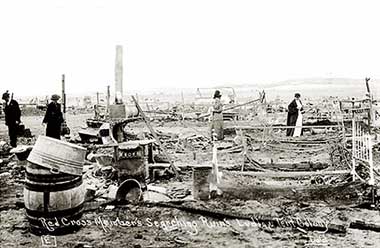
One of the joys of democracy is its ability to evolve. By using their words and actions, citizens in a democratic and/or republican society have the power to bring change not just to their society, but to the conventions which govern their society. The Quest for "Just and Pure Law": Rocky Mountain Workers and American Social Democracy 1870-1924 is an enlightening, highly readable chronicle of a little-known and less-well-understood period in our country's history where people used their civic duties as weapons for true justice, and it establishes its novice author, John Paul Enyeart of Bucknell University, as a historian to watch.
My knowledge of unions and socialism in this period left me unprepared for the text's revelations. My own studies of history gave me knowledge of the Knights of Labor, the IWW, and the AFL under Samuel Gompers which denied admission to the unskilled worker, as well as such key events as the Ludlow Massacre. And anyone with a college degree can't help but be aware of this period as giving birth to full-bloomed socialist ideas. But in describing the struggles and victories of workers in Colorado, Utah, and Montana, Enyeart documents a, if you will, radical spin on notions of the labor v. business struggle. Led by men and women with bold, altruistic ambitions, the Rocky Mountain laborers saw socialism not as an ideology of beliefs (as English socialists such as William Morris and George Bernard Shaw did) but as a matter-of-fact culture to be practiced and developed through trial and error, a culture promoting ensure fair and just lives for all mankind. And as they fought for living wages, proper conditions, and a voice in how the economy should be organized—fought, in other words, for their basic dignity—they chose neither the straight-ahead, purely economic methods of the AFL nor the direct action and calls for revolution of the IWW but a middle-ground involving wide-reaching organization, mutual support, and political establishment to mobilize workers to vote for pro-union candidates and measures.
There are many lessons to be learned from Quest. A century before Obama's presidency, Enyeart shows just how powerful a "yes-we-can," grassroots approach to politics can be with his impressive roll call of union successes in creating western society, as well as how important unity is—wisdom needed for a culture where moderates are pushed aside by the voices of the extreme left and right. Business began winning victories when anti-union executives formed an alliance of their own, and the movement began to fall apart when workers began giving in to racial and philosophical differences.
Enyeart takes care to use multiple, verifiable sources for his history, but still fills it with anecdote and narrative to charm the non-academic reader (his debunking of the union mythos of Joe Hill is one great example) and captures the sweep and color of the era in only 250 pages. The Quest for "Just and Pure Law" is like a perfectly textured three-ounce filet mignon…you want even more when you're done. And I hope Enyeart gives us more.
(Full disclosure…besides being an author and professor, Enyeart happens to be my cousin. This does not detract from the excellence of his book.)
No comments:
Post a Comment